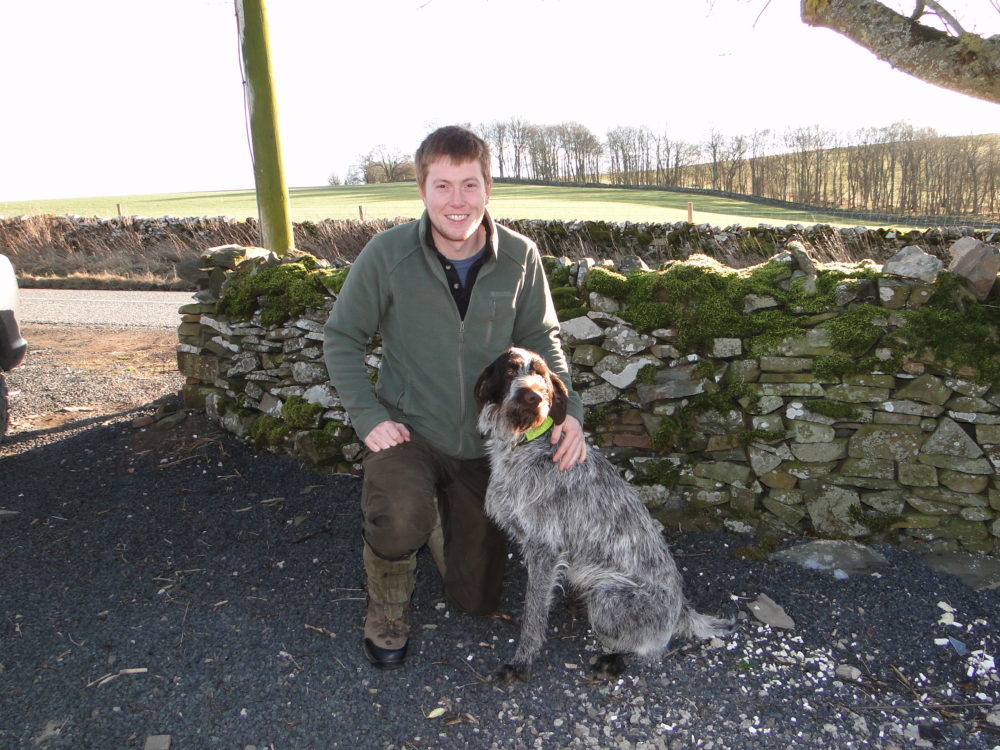This website uses cookies so that we can provide you with the best user experience possible. Cookie information is stored in your browser and performs functions such as recognising you when you return to our website and helping our team to understand which sections of the website you find most interesting and useful.
Growing Our people: An interview with Simon Blagg, Tilhill Forestry Assistant Wildlife Manager in the Central Borders
“Tilhill Forestry is a company that I was familiar with and I knew would provide me with a great start in the industry as a graduate, and provide me with a great platform to grow in the industry.”
What is your job role within Tilhill Forestry?
I am an Assistant Wildlife Manager in the Central Borders (Scotland) district of Tilhill Forestry.
What do you do? Tell us about your typical day?
My main role as an Assistant Wildlife Manager is the control of deer populations within managed properties. The main aim is the protection of newly planted young trees on both restock and newly planted sites, this helps to maintain a healthy and sustainable deer population whilst facilitating healthy tree growth. My other roles include damage assessments on leader growth of young trees, and pre-fell wildlife checks of mature standing trees to identify any wildlife concerns that could affect felling e.g. badger setts.
How did you get into wildlife management?
I have always enjoyed working in the countryside. I got my degree in BSc (Hon) Countryside and Environment Management at Harper Adams University, where I learnt about a wide variety of environmental areas, which include forestry and managing the countryside on a landscape scale, a key part of deer management. As part of my degree I had a year’s placement where I worked on a Scottish sporting estate under a deer stalker, which is where my interest in deer and wildlife management really grew. In my final year of university I did my dissertation on the damage deer can cause and management methods to prevent damage. After graduating I was searching for a full time job when the position at Tilhill arose. I knew it was perfect as it would provide me with the opportunity to put what I had learnt and enjoyed into practise.
What do you like and not like about working in this industry?
One of the main things I like about this role is the time I get to spend out in the forests and working in the stunning landscape. I also enjoy putting my skills and knowledge to use, whilst having the opportunity to learn and grow in the industry. Deer stalking is an activity that many people across the world enjoy and I feel very lucky to be able to do it as part of my job.
The early mornings and late evenings are a tiring aspect of the role, but was something I was fully aware of when I applied for the position.
Why did you decide to work for Tilhill Forestry?
This role was a great opportunity to be part of a nationwide company, where I could work with highly experienced colleagues in both wildlife and forestry management. Tilhill Forestry is a company that I was familiar with and I knew would provide me with a great start in the industry as a graduate, and provide me with a great platform to grow in the industry.
What do you like most about this company?
The people I work with are one of the best things about this company; from the start, everyone who I have worked with and met were helpful and friendly; this helps towards a great working environment.
How do you feel Tilhill Forestry contributes to its employees’ professional development?
Tilhill Forestry contributes greatly to its employees’ professional development by providing a variety of eLearning courses and training days. Key courses for me have been First Aid training and doing my ‘Deer Stalking Certificate Level 2’. These are both important qualifications to have in wildlife management, as they are key to doing the role and developing in the industry. Tilhill also perform yearly appraisals that helps personal development, as it can identify areas that you are performing well in and any areas where improvement is needed and how this can be achieved.
What sorts of changes are occurring in your occupation?
With many forests going through restructuring and new plantings occurring, our role is key in the protection and development of new young trees. We adapt our work style to maintain an efficient and high level of deer control. We also need to stay familiar with law and regulations which apply to deer control and wildlife management within forestry and the wider environment.
How does a person progress in your field?
In order to progress in the field it is vital to be able to learn from the experiences of yourself and others, whilst also being able to help advise your colleagues about key aspects of wildlife management, for example, current legislation.
What is your advice to anyone wishing to pursue wildlife management as a career?
For anyone wishing to pursue a wildlife management career I would first recommend doing a degree or qualification in a relevant field such as countryside management. I would strongly recommend gaining your ‘Deer Stalking Certificate level 1 and 2’ as this demonstrates a knowledge of deer and their control. Experience is also a key part of the role and the more experience you can gain in all aspects of deer control and wildlife surveying the better. It is also important to know that this is not a nine to five job and the hours you work can change greatly throughout the year and be unsociable at times, but if you enjoy working outside and being practical and active this is a great career choice.




